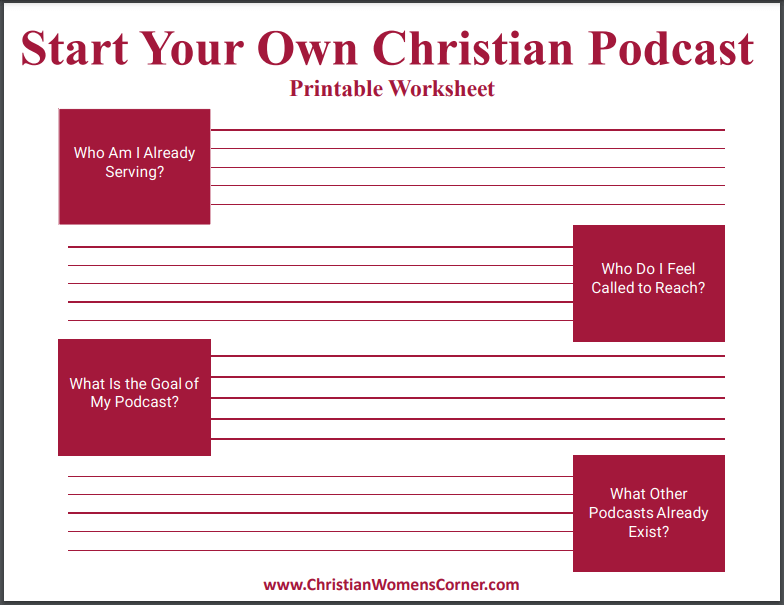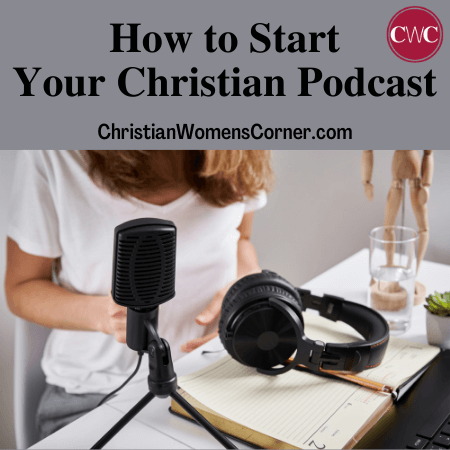- Welcome
- Christian Podcast
How to Start Your Christian Podcast
Howard was passionate about helping men break free from the chains of sexual addiction and pornography. He’d had an online ministry for two years, but recently, he felt led by the Spirit to start a Christian podcast. The only problem was he wasn’t sure where to begin or what to do next.
Maybe you’re where Howard is. The Spirit is nudging you to start a podcast, but you feel completely overwhelmed. You’re unsure of the first step to take or how to get the ball rolling. If that describes you, don’t despair. Where God leads, He will provide. Here’s what you need to know about launching a Christian podcast…

We have printable worksheets available to help you begin to plan your Christian podcast . They include guided questions that will trigger thoughts and ideas to help you create a well thought out plan. Click >>here<< for the worksheets.
4 Questions to Ask before Starting a Christian Podcast
When it comes to podcasting, you’ll save yourself a lot of time and frustration if you pause to consider a few questions first. Answering these questions will create a framework that allows you to serve your flock better and build the Kingdom. Here’s what you should prayerfully be considering…
Who Am I Already Serving?
Look at your existing ministry or business if you have one. This is the flock you’re already serving. Are you still happily serving them? Is God still using you to minister to them? Are you hearing reports from sheep whose lives have been positively impacted due to your ministry?
Sometimes, the answer to these questions is a quick and resounding “yes.” If that’s the case, then it’s likely the Spirit is nudging you to start a Christian podcast for your existing business or ministry.
However, there are moments when God calls you to a new flock. This is particularly common in lifestyle ministries or businesses. For example, you started a ministry to serve mothers of elementary school-age children because you were busy rearing kids of the same age. But now your kids are teenagers, and now you feel called to reach the parents of teens.
As long as the Spirit is leading, there’s nothing wrong with allowing your ministry or business to develop in a new direction. But it’s important to prayerfully consider whether this change is the result of God’s nudging or boredom with your current business or ministry.
Who Do I Feel Called to Reach?
If you don’t have an existing business or ministry, you must get clear on who your audience is. Think about who you feel compelled to reach, who you’re burdened for, and who keeps crossing your path. For example, God might keep putting former drug addicts in your life, and you feel overwhelmed with a desire to minister to them. Maybe God keeps bringing trauma victims into your life, and you can’t help but serve them.
Remember, the answer to this question must be specific. If you’re too broad and want to start a podcast for “everyone,” you’re not likely to be very effective. But if you have a specific audience in mind, such as “single dads” or “homeschooling parents,” you’re more likely to reach people.
What Is the Goal of My Podcast?
Once you know who the Spirit is leading you to serve, you need to consider the goal of your Christian podcast. The best and most effective podcasts have a clear goal for their audience, and they don’t deviate from it.
For example, maybe God has made it clear that He wants you to minister to those recovering from infidelity in their marriage. Then the goal of your Christian podcast might be the restoration of marriages.
Perhaps you feel most burdened for those dealing with mental health issues, and the goal of your podcast is to start conversations around mental health within the wider Christian community.
The clearer you are about the goal, the easier it will be to see God’s hand at work. You’ll be able to see if your podcast is truly accomplishing His will or if you need to course adjust.
For example, perhaps you start your Christian podcast to see marriages restored, but the Spirit keeps leading single moms to your episodes. The Spirit may reveal that He wants you to go in a new direction.
What Other Podcasts Already Exist?
It’s essential to research what other podcasts already exist that are ministering to your flock. These may include both secular and Christian podcasts that are popular.
If you’re not sure where to find podcasts, there are a few places you can look. Most podcasts are sorted by category, so make sure you look in the appropriate category. Some podcasts may be listed in multiple categories.
For example, if you’re looking for homeschooling podcasts, you might check “parenting.” But it would help if you also looked in “education” and “Christianity,” as these categories may also contain resources for homeschoolers.
Now that you understand categories, here are a few sites where you can start your podcast search:
After you find a few podcasts in your niche, take some time to listen to episodes of these shows. Pay attention to the ones that resonate with you and those that don’t. Look up reviews of the shows and see what other listeners say. Does everyone love a particular podcast but wish the host went more in-depth on a specific topic? Is there a popular podcast where the host talks in an irritating monotone?
Notice holes in the content as well. What topics are the podcasts hosts completely missing or glossing over? Maybe most hosts talk about getting out of debt but don’t go into enough detail or recommend a helpful financial tool. This is information you can share in your episodes.
It’s important to understand that this is not the time to compare yourself to others. It can be tempting to look at someone else and see their large platform. You may think your podcast will be so small that it can’t possibly make a difference. But remember that Jesus goes after the one lost sheep. Even one listener is precious to God, and He delights when you are faithful to the ministry He’s called you to.
You might think you can gloss over these questions and steps. However, if you don’t answer them and do your research, you may create a Christian podcast that doesn’t minister effectively to your flock. It’s better to take the time and build the foundation correctly at the beginning of your journey.
What Style of Podcast Will You Host?
As you listen to different podcasts, you may notice there are different ways to host a podcast. If you haven’t yet listened to any podcasts or aren’t paying attention, it’s easy to miss this. But there are four basic methods of hosting a podcast.
Share Your Own Thoughts
In this type of podcast, you’re the solo host. You can simply record yourself talking about a topic. This can be the easiest and most fun because you can be “off the cuff.” You don’t have to worry about waiting for someone else to schedule an interview or a co-hosting session.
Partner with Someone and Co-Host
This style of podcast hosting can be fun, and it often has a conversational feel. It’s especially delightful if you do it with someone whose company you genuinely enjoy, like a fellow businessperson, a close friend, or even your spouse. For example, if you’re doing a Christian podcast on marriages, your listeners might love having your spouse’s perspective in each episode.
Like solo recording, this is fun because your episodes can be “off the cuff.” You might want to have one or two conversation prompts at the beginning of the episodes, but as you and your co-host find your rhythm together, you might not even need that much.
Interview a Guest in Your Episode
In this format, you interview a guest. The goal of interviewing the guest is to minister to your flock and provide value to them. This means you want to choose guests that your listeners can relate to.
A single mom who overcame significant challenges to build a business is likely to resonate with your audience of entrepreneurs. But if your audience is single guys in their twenties looking for dating tips, it won’t be a good fit.
Keep in mind that this style of podcasting can require more work than other types. You have to find guests, arrange a time to talk together, do your research on them, show up for the recording, and edit the final audio.
Mix It Up with No Commitment
Some podcast hosts use a mix of formats. That’s what Kelly McCausey of Love People + Make Money does. She frequently interviews guests, but if she gets fired up about a topic, she’s not afraid to record a solo podcast, sharing her viewpoint with listeners.
You can do the same thing in the beginning stages of your podcast. As time goes on, you may settle into one format that fits you best, or you may continue the mix it up method indefinitely.
When choosing your Christian podcast hosting style, don’t be afraid to experiment. You will learn as time goes on, and you can trust that God will lead you to the best method for your listeners.
What Tech Will You Need for Your Podcast?
You’ve gotten clear on who you’re serving, what the goal of your podcast is, and you even know what hosting style you prefer. You’re almost ready to start your Christian podcast. You just need to figure out the tech.
If this part intimidates you, don’t worry. It doesn’t have to be overwhelming or complicated. There are three components to the tech you’ll need. There’s hardware, the software, and the podcast host.
Hardware is physical, tangible items you’ll need, such as a webcam or headset. Software is the virtual piece such as an audio recording program. Hosting is the virtual space where your podcast episodes will be stored.
The Hardware You’ll Need
First, you’ll need a good microphone. Sometimes, it’s tempting to use the built-in microphone with your laptop or computer. But these devices are usually low quality and will result in audio that’s difficult to hear or sounds choppy. For a good budget-style microphone, look into the Blue Snowball USB Microphone.
Some podcasters prefer to do more of a video podcast, like Kimberley Wiggins of Inspired Women Amazing Lives. She interviews her guests on camera and posts the episodes on YouTube.
If you choose to do something similar, you’ll want a good webcam. The Logitech C920x Pro HD Webcam is both budget-friendly and good quality. It works easily with most computers and devices.
A camera like this is designed to be attached to the top of your monitor, but if you don’t like that idea, you can grab a tripod and mount it to that. A good option for this is the Fugetek Mini Tripod which sits neatly on your desk and allows you to position your webcam easily.
While these initial expenses might make you question the wisdom of starting a podcast, they are investments for the Kingdom. You will use them repeatedly, and since they’re high-quality pieces, they’ll last for years to come, so you’ll get plenty of use from them.
The Software You’ll Need
Now that you know what hardware you’ll need, it’s time to look at the software. If you’re recording solo or if you and your co-host are in the same room, you can simply record your audio on a program like Audacity.
It’s free, and once your recording is finished, you can edit it as much as you wish. When you’re done, simply save it as an MP3 file.
If you’ll be doing video interviews, you can use Skype, a free communication tool that allows users to virtually “call” each other. You can even record your call. But once you’ve done this, you’ll need to download it as Skype only stores your recording for 30 days. Here’s a helpful tutorial on how to record your Skype call.
Some people don’t like Skype or have difficulty using it. If that’s you, check out Zoom. This is free web conference software you can use to record a call between yourself and other participants. Like Skype, you can record the conversation, making it easy to create a video podcast.
The Hosting You’ll Need
After you’ve decided on the hardware and software, you have one final decision: how you’ll host your podcast. To make it possible for your listeners to stream your podcast, you’ll need to upload it to a virtual server.
If you’re already paying for web hosting, you might think that you can simply upload your podcast to your website. But that’s a mistake because the size of the audio files can slow your website to a crawl. Your visitors will have difficulty accessing your site and your podcast.
There are a few options for hosting. If you are doing a video podcast, you could simply upload your video to YouTube or Facebook Live. If you want more control over your video, you could choose a video service like Vimeo. It has free and premium accounts, depending on your needs.
For an audio podcast, you can choose a host like Libsyn, Anchor (free), or Podbean. If you’re already using a service like Amazon S3, you can create a bucket for your podcast and simply store your episodes there.
Putting all the tech pieces in place for your podcast can feel a bit overwhelming at first. But just take it one step at a time, and you’ll get there!
Tips for a Successful Podcast Launch
You’ve scaled some pretty scary mountains lately. You’ve decided on who you’re serving and what the mission of your podcast is. You’ve dived deep into questions about hardware and software. Now, it’s time to start thinking about your Christian podcast launch. Yep, you’ll want to be thinking about this several weeks in advance. Here are a few tips to make sure yours goes smoothly.
Choose a Realistic Schedule
In the beginning, you may be tempted to believe that you can release a new podcast episode every day, but that isn’t realistic for most people. Aim for one episode a week in the beginning. Remember that you can always ramp up the amount of content you’re producing later.
Prepare Episodes in Advance
Having episodes ready ahead of schedule gives you plenty of lead time. Ideally, you want at least a few weeks of content already done. If you plan to publish once a week, record six episodes in advance. This way, you don’t have to worry if you come down with the flu and your voice is scratchy, or your guest has an emergency and can’t record with you this week.
Ask for Reviews
It’s not a good idea to ask for five-star reviews, but you can encourage people to leave reviews of your show. This isn’t egotistical or bragging. It helps get your message out there. It lets you grow your flock and build the Kingdom.
Share with Others
Tell your online friends and your offline ones about your new Christian podcast. Let them know how excited you are. Ask for their prayers and encouragement.
Don’t be afraid to seek out support if you need it during this time. It’s exciting to launch, sure, but it’s also scary. It’s OK to ask those around you to be there for you.
Create a Great Podcast Image
Make a podcast image that will speak to your audience. Don’t use a podcast image that is wrong for your target demographic. If you have an image of pink sparkles in a girly font, most people will assume your podcast is geared toward or about women.
Look to see what others in your podcast niche are doing with their graphic. If you don’t have graphic talent, ask a friend, or hire someone to do it for you. You can find podcast image creators on sites like Fiverr.
Launching your Christian podcast is thrilling. But it’s also a big commitment to your flock. Be prepared and ready to serve the listeners that God brings into your life!
Keep the Momentum Going
After the initial rush, it’s common to go through a letdown period immediately after a launch. That’s because you’ve worked hard for a long time, put in a lot of effort, and need to take a breather for a bit.
Make sure that you’re taking time to refill your own well regularly. This means spending time with God and continuing in your own faith walk. It’s hard to minister when you’re not regularly connecting with the Spirit.
You also need to spend time listening to other podcasts—both in your niche and out of it. You listen in your niche because you want to stay current with trends, know what issues are being discussed, and have your finger on the pulse of what listeners are looking for.
But also, listen outside of it because you can get trapped in a bubble where you’re only focused on your niche. You need to be following podcasters from all walks and on many different subjects.
Remember to absorb content that challenges you. You don’t have to agree with all the content you read, see, or hear. It’s important that you embrace ideas from people with different worldviews.
It doesn’t mean you have to accept everything they say as truth or agree with their choices. But these challenging content pieces can be just what you need to kickstart a discussion on your own podcast.
Finally, speak boldly in your recordings. You want to share truth and do so in love, but you also need to be courageous. Go forward and trust the Spirit to lead you and speak through you.
It’s comfortable in the boat, but often God calls outside of our comfort zone to display His power and His goodness. Don’t be afraid to listen to the Spirit’s nudging on starting a Christian podcast!
Grace and peace,
Alicia
Free Downloads
Whew! You made it to the bottom of this blog post. I appreciate you taking the time out of your busy day to read what was on my heart. I'd like to thank you by offering two free PDF downloads when you fill out the form below.
Make sure to click the box beside 'Subscribe to the CWC Email Community' to receive our monthly newsletter and a few emails a month to keep you informed about our community, updates on the website, and to send you cool free stuff!

The first is a workbook that goes deeper into starting your own Christian podcast. It includes guided questions and places for notes.
The second is a checklist that contains tips, ideas and suggestions about starting your Christian podcast.
You can read the PDF downloads on whatever electronic device you use and fill out the workbook answers in your own notebook.
Another way to enjoy the downloads is to print them out on your home printer or email them to your favorite printer like the UPS Store, Staples Business Depot, or Kinkos and use them in printed form.
Your information is 100% private & never shared.
- Welcome
- Christian Podcast









